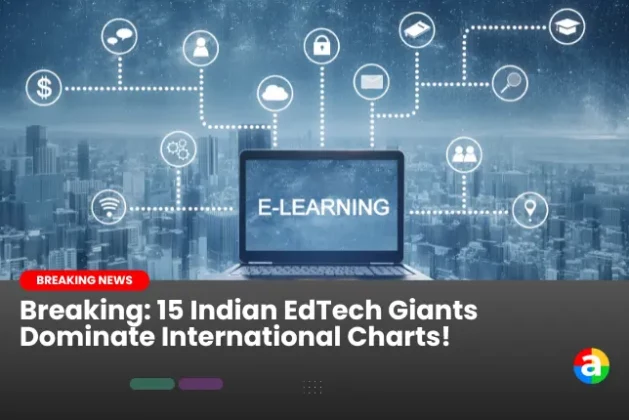Summary –
- Emeritus, an Indian edtech company, has been recognized as the top “World’s Top EdTech Companies of 2024” by TIME Magazine. The Indian firm, established in 2015, collaborates with renowned global institutions like the University of Cambridge, Harvard Business School, and MIT Sloan.
- Emeritus plans to relocate its headquarters to India for a stock market listing. The ranking also includes Indian companies Scaler Academy and Eupheus Learning, highlighting India’s burgeoning tech ecosystem.
Introduction: Recognizing Emeritus’s Achievement
Emeritus, a pioneering force in online education, has clinched the prestigious top spot in TIME Magazine’s esteemed “World’s Top EdTech Companies of 2024” ranking. This recognition underscores Emeritus’s unwavering commitment to delivering high-quality educational programs in collaboration with renowned global institutions.
Emeritus’s Journey and Impact
Emeritus was established in 2015 by Ashwin Damera and Chaitanya Kalipatnapu, visionaries driven by a mission to democratize education through digital platforms. The company’s portfolio boasts courses from illustrious institutions like the University of Cambridge, Harvard Business School, and MIT Sloan, empowering learners worldwide with access to world-class education.
Recently, Emeritus gained further acclaim when Harvard Business School featured its success story as a compelling case study, highlighting the company’s innovative approach and impact on the educational landscape.
Strategic Shift and Expansion Plans
In a strategic move, Emeritus expressed intentions to relocate its headquarters from Singapore to India in pursuit of a stock market listing. This decision underscores Emeritus’s ambitions to deepen its roots in India’s burgeoning tech ecosystem and marks a significant milestone in its growth trajectory.
The Indian EdTech Vanguard in TIME’s Ranking
Notably, Emeritus is not alone in representing India’s burgeoning edtech prowess on TIME’s prestigious list. A total of 14 Indian edtech firms secured positions, reflecting the country’s vibrant educational technology landscape.
-
Miko, a trailblazer in AI-powered robots for children, holds the 26th spot.
-
Unacademy, a leading competitive exam preparation app, secured the 54th position.
-
upGrad, founded in India and headquartered in the US, ranks 69th.
-
Univariety, offering technology solutions for educational institutes, clinched the 82nd position.
-
iNurture Education Solutions, focusing on university-industry partnerships, claimed the 83rd spot.
-
Uolo, dedicated to empowering schools, holds the 90th position.
-
Cuemath, renowned for its innovative math teaching methods, secured the 100th rank.
-
Skill-Lync, specializing in engineering courses, holds the 171st position.
-
LEAD School and MyClassboard, both dedicated to school transformation and management solutions, secured ranks at 226th and 241st respectively.
-
GeeksforGeeks and STEPapp, focusing on tech/coding courses and gamification, claimed positions at 245th and 250th.
Global Representation in EdTech Innovation
The TIME list of 250 edtech companies reflects a diverse global landscape, with a significant presence from the US, China, the UK, and other countries. This global representation underscores the widespread impact and transformative potential of educational technology across borders.
Rising Stars: Indian EdTech’s Ascent
In addition to established players, two Indian companies, Scaler Academy and Eupheus Learning, were recognized as rising stars in TIME’s “World’s Top EdTech Rising Stars of 2024.” This acknowledgment further cements India’s position as a hotbed of innovation and creativity in the education technology sector.
For more such content, follow: Analytics Jobs
Conclusion: Pioneering Education Transformation
Emeritus’s ascent to the top of TIME’s edtech rankings symbolizes more than just recognition—it signifies a broader educational transformation powered by technology and innovation. As the global education landscape evolves, companies like Emeritus and its Indian counterparts continue to spearhead change and redefine learning paradigms.



